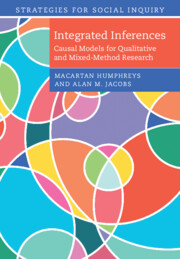‘An ambitious attempt to leverage the strengths of qualitative and quantitative social scientific approaches by embedding them within a Bayesian framework, this book will give economists, political scientists, and other researchers a lot to chew on for years to come.’
Andrew Gelman - Columbia University
‘This study will become required reading for researchers seeking to answer causal questions in the social sciences. Humphreys and Jacobs provide a framework that helps researchers assess the relative contribution of different pieces of evidence - either qualitative or quantitative - in answering causal questions.’
Isabela Mares - Yale University
‘Many books aspire to be useful to both qualitative and quantitative researchers, but few succeed as well as this novel approach to integrating case-level and population-level evidence to make causal inferences. Starting from a focus on causal models, Integrated Inferences explains how to use Bayesian logic to update models based on evidence, and how to select cases and collect data to further probe those models on particular causal questions. In short, it turns the model-dependence of inferences from a bug into a feature. An extremely valuable addition to graduate research methods courses.’
Andrew Bennett - Georgetown University
‘With this illuminating book, Humphreys and Jacobs expand their pioneering approach to multi-method research, combining the Bayesian foundations of Lindley and Savage, the scaffolding of Neyman, Rubin, and Holland’s causal reasoning, and the flexible architecture of Pearl and Glymour’s DAG models. Social science scholars will find an engaging and accessible exposition and synthesis of ideas that are otherwise scattered across a sometimes daunting literature in statistics, computer science, philosophy, and political science.’
Tasha Fairfield - London School of Economics and Andrew Charman, University of California, Berkeley



